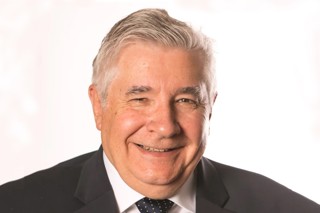Having recently posted its fourth consecutive year of record results, John Clark Motor Group could be forgiven for looking cheerfully at the prospects ahead.
Having recently posted its fourth consecutive year of record results, John Clark Motor Group could be forgiven for looking cheerfully at the prospects ahead.
Having recently posted its fourth consecutive year of record results, John Clark Motor Group could be forgiven for looking cheerfully at the prospects ahead.
Having recently posted its fourth consecutive year of record results, John Clark Motor Group could be forgiven for looking cheerfully at the prospects ahead.
However, for founding chairman and managing director John Clark, vigilance is the order of the day – he doesn’t want his group’s growth to falter and needs all employees to be on the ball as UK motor retailers come under more and more influence and pressure from third parties.
♦ View a gallery of images from John Clark Motor Group Aberdeen
The group has its head office in Aberdeen, but it operates 21 car dealerships across the east and south-east of Scotland, which operate under the John Clark, Specialist Cars and Pentland brands. Its headcount has passed 1,000 employees since its acquisitions last year of two Jaguar and two Land Rover businesses. It is Scotland’s second-largest motor retailer behind Arnold Clark Automobiles.
FACTFILE |
|
|
John Clark Motor Group is a family-owned franchised dealer group with 21 dealerships from Aberdeen to Edinburgh. Its franchises comprise Audi, BMW, Jaguar, Land Rover, Mini, Nissan, Seat, Škoda, Volkswagen and Volkswagen Commercial Vehicles. The business recently invested £4m in new facilities for its Nissan and Mini franchises in Aberdeen. It has plans to refurbish other dealerships within 18 months, including Dundee Audi and Aberdeen VW. A new-build development is expected to be announced in the coming weeks.
Turnover
New vehicle sales
Used vehicle sales |
|
In 2013, group pre-tax profit reached £7.4 million, while turnover increased 33% from 2012, to £470m. In 2014, John Clark expects the business to break through the half-billion pound mark and go further – the budget was for £534m of sales and Clark said performance is already ahead of plan. That means it will smash another personal best set last year, when John Clark Motor Group sold 20,000 new and used cars for the first time in its history. Looking further ahead, Clark is honest about not knowing whether the records will continue to be broken. The messages about the economy doing considerably better are hard to interpret, he said, given that people’s wages still haven’t caught up with the increased cost of living and that any rise in interest rates will have an effect, particularly on monthly mortgage payments.
“I think the industry has been getting away with murder for a long time with the way it has been increasing prices for cars and for service bills, which we [John Clark] certainly cannot get away with nor have we tried to get away with.
“I do believe this growth will continue on to 2015 but again, the changes coming in with the FCA rules bring some uncertainty.”
Finance ‘is a means to an end, to a sale’
Clark’s viewpoint on the new regulatory regime is similar to that expressed by many other UK dealers AM talks to. Prior to our interview appointment, Clark had been in a board meeting where FCA regulation and finance incentives were a hot topic of discussion – John Clark Motor Group operates its own joint venture finance company and contract hire business in addition to offering manufacturer finance.
Clark said the group does a lot of finance, which it has incorporated into the sales process. It has business managers in all its franchised sites and certain dealerships doing high sales volumes have multiple BMs – one site has six. A group F&I manager based at the Aberdeen headquarters oversees the function. Current finance penetration is 66% of new cars and 53% on used, both three percentage points higher than last year’s results. The group is Specialist Automotive Finance-approved.
“It is very important to us because it is a means to an end, to a sale, and that’s why PCP has been so important recently. Go back 10 years and it was only hire purchase and some contract hires, but now the mindset of the customer is in monthly payment.”
[page-break]However, much of the manufacturer-supported finance, backed with deposit contributions and the like, leaves little margin for the retailer. “We could make more money if we were doing it other ways, but we can’t have it both ways. We want to sell the unit, but we want to earn from it.”
He sees FCA regulation as a headache. He understands why the FCA wants to put in regulation, after the harmful activities of the banks and payday lenders, but he is concerned about over-regulation impacting the benefits that customers gain from point-of-sale finance and fears the FCA does not understand the motor trade.
He questions whether consumers will happily answer questions in a dealership about their gross earnings and outgoings to determine affordability when they’ve been used to filling out an application and being credit-checked by the finance company. The outcome could be that the customer walks out to arrange their own finance elsewhere.
“At John Clark one of the things we’ve never done is put people into deals that they don’t understand,” he said. “The processes we have now are pretty prescriptive because what we do was controlled by the FSA in any case, so we are doing it by the book. It just becomes more complex now, adding some more bits and pieces to how you do it.”
‘The add-on is a key part of dealer profitability’
Clark’s dealerships take a pragmatic approach to upselling add-on products, given that the business’s focus is heavily weighted towards providing the right customer experience and Clark understands that customers’ disposable income has been constrained.
The group is not heavily engaged in insurance sales, except for GAP insurance, which Clark believes is valuable to the consumer buying a high-value vehicle and increases the profit in the car sale. His reluctance to offer other insurance products is due to the regulation – he doesn’t see the returns as worth the risk of being accused of mis-selling.
Its other key products in sales are paint protection, with which the group achieves 41% penetration, plus manufacturer service plans as a retention tool. In aftersales, all vehicles receive an electronic vehicle health check (eVHC) to identify any additional urgent work. As a result of this eVHC and all its dealerships offering tyres price matched against the major independent chains, the group has tyre sales penetration of 20%.
[page-break]“The add-on is a key part of the dealer’s dealer profitability because we’ve had to look at other ways to make money when we’ve lost the traditional ways of making it on the car.”
‘Our focus is on used car sales and service profitability’
The frequent changes of leadership at manufacturer national sales company level does little to help the industry, Clark said. Those who pump up sales volume in the belief it’s money from heaven before heading off to another job don’t benefit the process and leave their franchisees to cope with the after-effects.
“A change to the leader can make a complete change to the franchise, a change to the profitability for the dealer network. With the current volumes we’re all enjoying, what would we have if that volume suddenly disappeared?
“Sitting back, you’ve got to look at these things. So our focus is on used car sales and service profitability while still giving high levels of customer satisfaction.
“It’s a very fine balance to make sure that you are doing all the things that manufacturers want you to do, and by the same token, to increase your profitability.”
Clark said he cannot get to grips with the euphoria about the size of the new car market at present. While some of it may be pent-up demand, from people who’d held off changing their car until economic recovery appeared secure, he fears manufacturers pushing the rental markets and retail PCP business based on very high residual values will create a softening of used car values. A drop in used car values as the new car market flattens out will impact on any dealer’s profitability.
“I think we’ve invested fairly wisely in what we’ve done, we’ve just got to be cautious about what we do in future because we’re not sure about the market. It’s all very well talking about figures, but you have to remember we’re on the back of a very strong market. And we’ve been here before.
“Do I see us having the same economic turmoil that we had in 2007/2008, I don’t. But we haven’t seen the end of the current battles in Syria, Israel and Ukraine, and how we deal with the Russian problems is bound to cause us problems ourselves.”
Like manufacturer churn, those problems are well out of the hands of John Clark Motor Group. For now, he and his business development director (and son) Chris, who will take over the managing director role in 2015, must concentrate on the opportunities and challenges they can influence.
Further ahead, Clark would like to grow, through acquisition and organically. Its purchase of two Jaguar dealerships from Pendragon last year leaves it well placed when Jaguar’s XE mid-size saloon comes to market in 2015 in a new segment for the marque. Clark’s single Nissan dealership, in Aberdeen, is steadily winning market share in its territory and has been rehomed in a purpose-built showroom. Expansions to several other premises are also on the cards.
Should acquisitions be on the table, he would like the business to expand with some of its existing brands. Northern Scotland could provide opportunities closer to home, but asked if he’d broaden the group’s footprint south of the Border, Clark’s caution did not desert him: “It will take a bit of a push for us to go south of the Border, but there’s a possibility of that.” .
Login to continue reading
Or register with AM-online to keep up to date with the latest UK automotive retail industry news and insight.





















Busterrabbit - 20/11/2014 11:14
The PCP bubble will burst soon, PCPs haved damaged the sales (and therefore the RVs) of used cars and there will be hundreds of thousands of buyers in negative equity when they come to change their car, what are they going to do, cough up a few £000's and start again? I think that PCPs will soon be viewed as the "endowment mortgage" of the car industry, and the FCA will get involved, again. Talking of mis-selling, who needs paint protection with modern cars? It might make a car marginally easier to clean but is it worth upwards of £300? This type of upsell shows that customers' interests are not paramount, it's about maximising profit, whatever the PR speak.